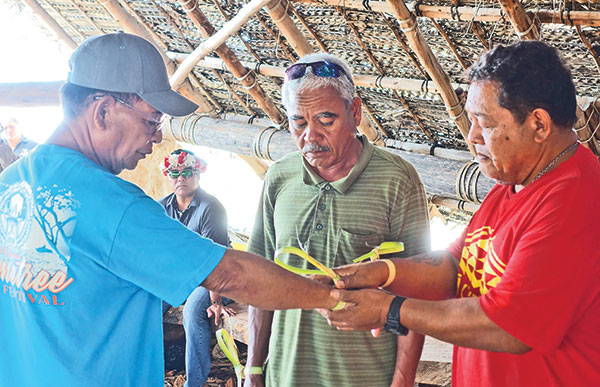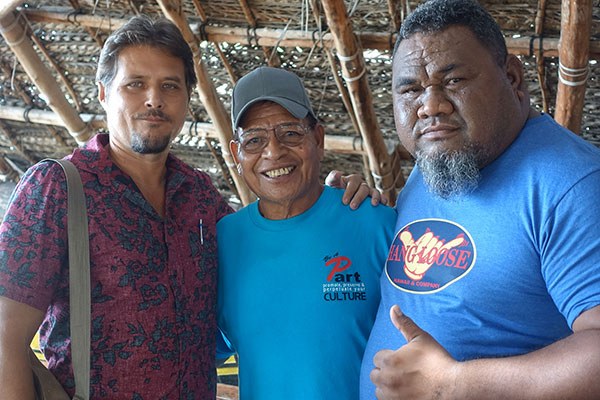ANTONIO ‘TONY’ URMEYANG PIAILUG
Becoming a master navigator

Grand master navigator Ali Haleyalur, right, wraps a woven coconut leaf called a RowPai around Antonio “Tony” Urmeyang Piailug’s right wrist, left, to signify the completion of the “Pwo” rites, as grand master navigator Sesario Sewralur, center, looks on.
(IVA MAURIN)
After four days of the sacred “Pwo” initiation rites, which involved the rigorous “pounding” of traditional navigation knowledge, Antonio “Tony” Urmeyang Piailug is now officially a master navigator.
The “Pwo” ceremony, which began Saturday at the Department of Community and Cultural Affairs’ Commonwealth Council for Arts and Culture Seafaring Traditions Canoe House in Susupe, ended with a special feast yesterday.
“I was excited and happy,” Piailug said. “It is so nice for everybody to [see] what we used to do when you become a navigator.”
Grand master navigators Ali Haleyalur and Sesario Sewralur arrived on Saipan to carry out the “Pwo” initiation for Piailug. As Haleyalur explained it, “‘Pwo’ means pounding. We have the pounding stone that we pound the taro or breadfruit. The name ‘pwo’ comes from the pounding stone. It is like pounding all the knowledge into the person. When you are initiated into the ‘pwo’ ceremony, it means you are getting all the knowledge required for you to learn in the navigational term. And, right after when the ‘Pwo’ is finished, you are called ‘Pwo,’” said Haleyalur.
“Pwo” is a sacred ritual for individuals who have successfully concluded a rigorous course of training in traditional wayfinding and are initiated into the secrets of master navigators.
Piailug explained that, in going through the “Pwo” ceremony, one gains knowledge needed to becoming a navigator. He explains that a navigator will have a responsibility to his crew.
“As you become a navigator, that is where you have to make sure you take care of your crew, take care of what’s going to happen to your boat in the open water,” he said.
With his sacred initiation complete, Piailug now joins members of his family who are navigators, including his father, Pius “Mau” Piailug, and brother, Sewralur, both grand master navigators.
Piailug said he looks forward to continue working on his project to finish building a traditional canoe.
The master navigator co-manages the DCCA’s seafaring traditions program, with a project to build the first large- scale Chamorro oceangoing vessel in 200 years.
John Castro, project coordinator of the seafaring tradition program, said that, with Piailug now a master navigator, it is both a blessing and an honor.
“We are so blessed and honored that Tony [Piailug] now being a master navigator, he leads us through all of these, from the construction of the canoe, to [sailing] out there [in the open ocean] where we’re reading the stars.”
With the seafaring traditions program working to encourage the youth to learn and embrace building canoes and traditional navigation, Piailug, too, hopes for his 3-year-old grandson to be a future master navigator.
“As a small boy, he can learn faster,” Piailug said recognizing that it would take years for his grandson to become a master navigator.
If ever, it would be a full circle for Piailug, who started sailing as a young boy too, with his father.
The “Pwo” ceremony was the first one ever held in the CNMI.

Master navigator Antonio “Tony” Urmeyang Piailug, center, poses with Department of Community and Cultural Affairs executive director Robert Hunter, left, and Carolinian Affairs Office executive director John Tagabuel at the closing ceremonies of the sacred “Pwo” initiation yesterday at the DCCA Commonwealth Council for Arts and Culture Seafaring Traditions Canoe House in Susupe.
(IVA MAURIN)























